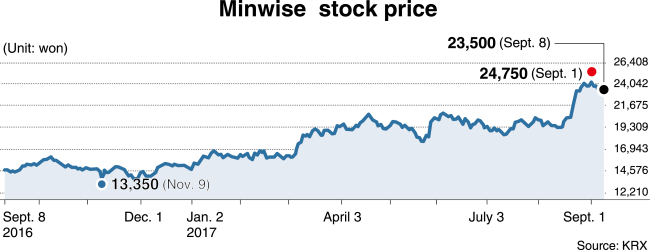[Kosdaq Star] Minwise’s foray into fintech buoys foreigner appetite
By Son Ji-hyoungPublished : Sept. 10, 2017 - 15:51
This is the 41st in a series of articles analyzing major companies traded on the tech-heavy Kosdaq market. -- Ed
The blockbuster debut in July of Kakao Bank, an online-only bank launched by messaging app giant Kakao, has driven a surprising stock race among fintech companies listed on the nation’s stock market. And Minwise, a digital security service provider based in Seoul, has been one of a few beneficiaries.
More than two years after going public on South Korea’s secondary bourse Kosdaq, Minwise, which monopolizes mobile digital authentication services in Korea, has delivered its strongest performance in the past few weeks. The company is being watched closely by foreign investors.
Jumping into the fintech market in October was a critical decision, which appears to have catalyzed foreign buying momentum throughout August, despite market risks growing over the latest North Korea missile threats. The mounting geopolitical instability virtually ended local stock markets’ monthslong bull run. But Minwise remained unfazed by the risks.
While the Kosdaq rose 2.23 percent over the cited period, stocks of Minwise rose 20.5 percent in the last 20 trading days through Friday.

Foreign investors held 16.2 percent of Minwise stock on Thursday, an all-time high, a week after they had net purchased shares for 15 consecutive days dating to Aug. 8, when its preliminary second-quarter earnings were released. The buying momentum pushed the stock price to an intraday high of 24,750 won on Sept. 1, a record high since July 30, 2015 when the company was listed.
Minwise’s decision to purchase 47 percent of Settlebank shares worth 46.4 billion won in October 2016 enabled the firm to jump into virtual bank account services and strengthen its grip on the online cash payment business. Settlebank took more than 90 percent of market share in virtual bank accounts, the second most widely used means of electronic transactions in Korea following credit and debit cards.
Through the decision, co-Chief Executive Lee Kyung-min -- formerly a finance specialist and marketer at NHN Corp., now known as internet juggernaut Naver -- expected a synergistic effect between Minwise’s original IT solutions and Settlebank’s penetration into the fintech business. Minwise currently holds 42.4 percent of Settlebank.
The blockbuster debut in July of Kakao Bank, an online-only bank launched by messaging app giant Kakao, has driven a surprising stock race among fintech companies listed on the nation’s stock market. And Minwise, a digital security service provider based in Seoul, has been one of a few beneficiaries.
More than two years after going public on South Korea’s secondary bourse Kosdaq, Minwise, which monopolizes mobile digital authentication services in Korea, has delivered its strongest performance in the past few weeks. The company is being watched closely by foreign investors.
Jumping into the fintech market in October was a critical decision, which appears to have catalyzed foreign buying momentum throughout August, despite market risks growing over the latest North Korea missile threats. The mounting geopolitical instability virtually ended local stock markets’ monthslong bull run. But Minwise remained unfazed by the risks.
While the Kosdaq rose 2.23 percent over the cited period, stocks of Minwise rose 20.5 percent in the last 20 trading days through Friday.

Foreign investors held 16.2 percent of Minwise stock on Thursday, an all-time high, a week after they had net purchased shares for 15 consecutive days dating to Aug. 8, when its preliminary second-quarter earnings were released. The buying momentum pushed the stock price to an intraday high of 24,750 won on Sept. 1, a record high since July 30, 2015 when the company was listed.
Minwise’s decision to purchase 47 percent of Settlebank shares worth 46.4 billion won in October 2016 enabled the firm to jump into virtual bank account services and strengthen its grip on the online cash payment business. Settlebank took more than 90 percent of market share in virtual bank accounts, the second most widely used means of electronic transactions in Korea following credit and debit cards.
Through the decision, co-Chief Executive Lee Kyung-min -- formerly a finance specialist and marketer at NHN Corp., now known as internet juggernaut Naver -- expected a synergistic effect between Minwise’s original IT solutions and Settlebank’s penetration into the fintech business. Minwise currently holds 42.4 percent of Settlebank.

The synergy effect appears to be paying off recently, riding on the popularity of Minwise’s new homegrown customers, including online-only banks K bank and Kakao Bank and major cryptocurrency brokerages Bithumb, Korbit and Coinone.
Before the birth of Kakao Bank, Minwise more than doubled sales in the first half of 2017. It posted some 36.1 billion won in operating revenue in the first half of the year, up 116.4 percent on-year, according to a regulatory filing with the Financial Supervisory Service. Its first-half operating profit came to 10.4 billion won, up 48.6 percent on-year.
Among all revenues, the fintech service earned Minwise 8.13 billion won in the first half, over threefold that of the previous year’s 2.45 billion won.
However, such a move does not mean Minwise’s cash cow -- its mobile authentication service -- has given way to its fintech business. Launched in 2010, its mobile security service has allowed phone users of all three telecom firms here to sign into websites free of security threats.
Through its security service, Minwise earned some 19.3 billion won, or 53.5 percent of its total revenue, in the first half of 2017, up nearly 65 percent from 11.7 billion won a year prior.
Before the birth of Kakao Bank, Minwise more than doubled sales in the first half of 2017. It posted some 36.1 billion won in operating revenue in the first half of the year, up 116.4 percent on-year, according to a regulatory filing with the Financial Supervisory Service. Its first-half operating profit came to 10.4 billion won, up 48.6 percent on-year.
Among all revenues, the fintech service earned Minwise 8.13 billion won in the first half, over threefold that of the previous year’s 2.45 billion won.
However, such a move does not mean Minwise’s cash cow -- its mobile authentication service -- has given way to its fintech business. Launched in 2010, its mobile security service has allowed phone users of all three telecom firms here to sign into websites free of security threats.
Through its security service, Minwise earned some 19.3 billion won, or 53.5 percent of its total revenue, in the first half of 2017, up nearly 65 percent from 11.7 billion won a year prior.

Along with its robust performance, the firm’s investor-friendly approach, evidenced by its dividend yield that reached 24.5 percent as of 2016, has increased investors’ appetite for the stock, wrote Park Jong-sun, an analyst at Eugene Investment & Securities.
The firm’s credit rating has been on a gradual increase, reaching A- in June for the first time, according to a local credit appraiser, e-Credible.
By Son Ji-hyoung
(consnow@heraldcorp.com)
The firm’s credit rating has been on a gradual increase, reaching A- in June for the first time, according to a local credit appraiser, e-Credible.
By Son Ji-hyoung
(consnow@heraldcorp.com)



















![[Today’s K-pop] Treasure to publish magazine for debut anniversary](http://res.heraldm.com/phpwas/restmb_idxmake.php?idx=642&simg=/content/image/2024/07/26/20240726050551_0.jpg&u=)